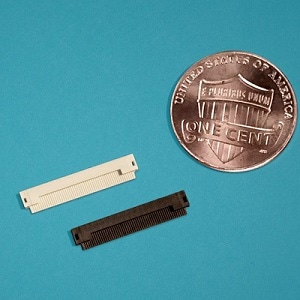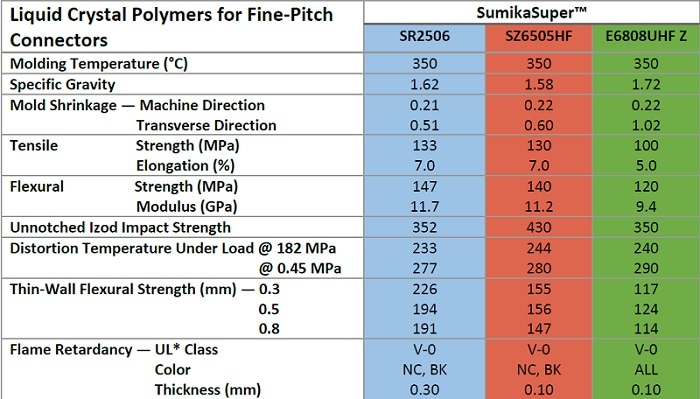Liquid crystal (or crystalline) polymers (LCPs) are widely used in the electronics industry for a variety of surface-mount technology (SMT), including connectors — for example, small-outline, dual inline memory modules (S/O DIMMs) for laptop computers and flexible printed circuits (FPCs) for smartphones and tablet computers — because these resins provide excellent flow to fill complex geometries in short cycle times, exceptional thermal and chemical resistance, unique mechanical properties, they achieve UL* 94 V-0 flame retardance without needing flame retardant additives, and offal/scrap can be recycled (melt reprocessed).

Meeting the Challenging Requirements of Fine-pitch Connectors
In a growing number of cases, LCPs also are being selected to mold very-demanding fine-pitch connectors, which are smaller, thinner, and designed to be stacked higher than traditional connectors in order to save real estate (space) on printed-circuit boards (PCBs) to meet miniaturization trends for smaller, more compact consumer electronics. To support this trend, Sumitomo Chemical Advanced Technologies LLC has developed two new SumikaSuper™ LCP grades specifically designed to meet the challenging requirements of fine-pitch connectors.
Fine-pitch connectors are a newer type of interconnect useful in PCB designs where space is limited and small center line or pitch spacing makes larger wire-to-board interconnects impractical. They tend to provide ultra-fine pitch spacing (0.2 to 0.3 mm), are smaller and thinner than traditional connectors, and are optimized for lower profile stack heights (down to 1 mm) but higher stacking density than conventional connectors. Additionally, these high-density connectors must be rugged, reliable, and affordable, must provide high thermal and chemical resistance to survive surface-mount processing conditions as well as to operate in compact devices with less space to dissipate heat. The new SumikaSuper LCP grades for fine-pitch connectors offer excellent processability and low warpage in very-thin wall sections to accurately mold the thin, light, small interconnects and through holes.
Thermoplastic Parts with Unique Processing Characteristics and High Performance
In the world of plastics, LCPs are a family of polymers that produce thermoplastic parts with unique processing characteristics and extremely high performance.
Most commercial LCPs are aromatic polyesters that are characterized by:
- High thermal performance
- High mechanical performance
- Inherent flame retardancy
- Good weatherability
- Excellent electrical properties
- High resistance to stress cracking
- Chemical inertness
This makes them ideal for use in electrical and electronic components (including fiberoptic cables, PCBs, chip carriers and other surface-mount components, microelectromechanical systems (MEMS), automotive applications (including components for ignition and transmission systems, lamp sockets, pump components, coil forms, and sensors), printer/copier/fax components, cookware, high-barrier/retort-processed food containers, plus components for chemical processing (including pumps, meters, and valves).
LCPs are most commonly processed via injection molding, although other techniques such as fiber spinning, extrusion, coating, and sheet and film products have been used. They are amendable to a variety of thermoplastic welding techniques, particularly ultrasonic and laser welding. Owing to the highly rigid structure of their molecular chains and their liquid crystalline nature — which tend to be nearly linear and to occupy a stacked orientation that maintains its order regardless of solid or liquid phase — LCPs are highly anisotropic.
Essentially, primary bonds within an LCP polymer chain are highly attractive and hard to break, while secondary bonds between molecular chains are weaker and much easier to break. Although most thermoplastics and especially fiber-reinforced thermoplastics exhibit some degree of anisotropy after processing, the molded properties of LCPs can be significantly different in flow and cross-flow directions, which requires some care when designing parts with and tools for these polymers to take advantage of (and avoid the challenges of) this characteristic. The highly ordered and linear nature of these molecular chains provides LCPs with self-reinforcing properties in the flow direction and contributes to excellent mechanical properties.
New LCP Grades Specially Designed for Fine-Pitch Connectors

Like any material, LCPs have their disadvantages, although these issues can generally be overcome. For example, the high anisotropy found in LCPs means that weldlines (where flow fronts with different molecular orientations converge) are weaker and thus prone to warpage and thermal-expansion differentials. In fact, LCPs are typically reinforced with glass fiber and mineral fillers — not so much to increase stiffness and strength but to reduce anisotropy. Warpage can be ameliorated through proper gate design in the injection molding tool. Because of their high performance, LCPs are priced accordingly.
However, given their high melt flow rates, fast setup times, and low thermal expansion in the direction of flow, LCPs can be formed into thin-wall parts with short molding cycles that deliver high performance at low mass and lower material usage — all of which help offset higher initial material costs. (They also can be molded into large, thick-walled parts too.) The thermal stability typical of LCPs enables processors to efficiently reuse regrind and recycle reject parts, which again reduces material losses and lowers effective part cost. Hence, LCPs are commonly used to replace metals, ceramics, and other plastics due to high thermal resistance, excellent flowability, and opportunities for weight or wallstock reductions.
In the case of fine-pitch connectors, the two new grades — SumikaSuper SZ6505HF, which provides higher flow for parts with thicknesses at or above 0.10 mm, and SumikaSuper SR2506, which provides higher flow for parts with thicknesses at or below 0.08 mm — provide a number of benefits vs. standard grades of LCPs in the same chemistry. For example, they exhibit improved injection molding processability in thin walls (injection pressure vs. filling ratio, flow length vs. thickness, and temperature vs. viscosity. In fact, both new grades are said to have set new standards for flowability and processability vs. polyester-based LCPs in the global market. They also are less prone to warpage in thin walls than standard grades of LCP.
Sumitomo Chemical can offer a suitable LCP grade depending on the design and thickness requirements of a given connector. The company has been producing polyester-based LPCs since 1972 and provides dozens of compounds as well as alloys with other high-performance thermoplastics like polyethersulfone (PES) to meet a wide range of mechanical and thermal requirements (from 260 to 360 °C). In addition to high-quality material, the company also is known for its first-class technical support — from part design to on-site molding assistance.